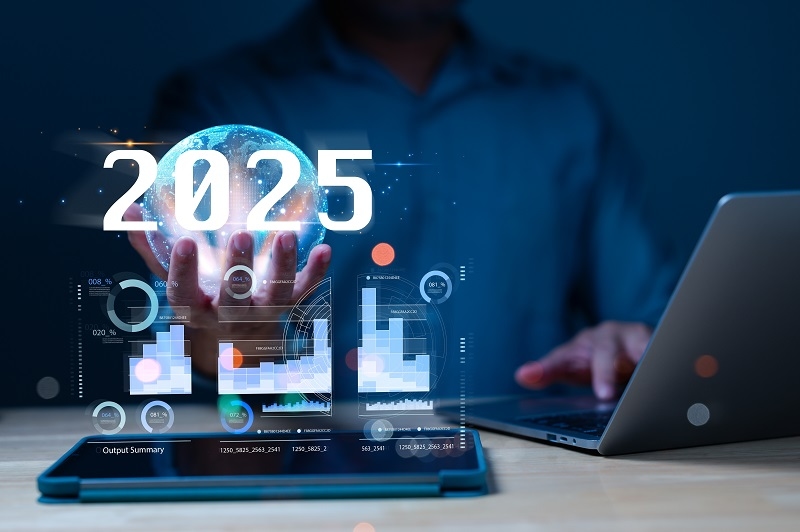
The panorama of synthetic intelligence is evolving rapidly, and Tech Insights 2025 highlights the transformative potential of agentic AI and AI digital assistants 2025 in commercial enterprise, private productivity, and virtual innovation. Organizations can use self-sustaining sellers' inclinations and AI behavioral automation to automate complex workflows, make better semi-intelligent decisions, and conduct consumer research. It is essential to understand those improvements to ensure the enterprise keeps momentum in the generation space. Tech Insights 2025 states that agentic systems and intelligent virtual assistants aren't an option; they are necessary if the enterprise is interested in strategic growth and operational performance.
Agentic AI is designed to work for humans independently in that it delivers an action, makes decisions, and adjusts to changes with little or no experience of daily human intervention. Agentic AI differs from historic AI in that the latter must rely on instructions and/or programming for task completion, whereas agentic systems that are (1) programmed to assess their spatial condition, (2) establish priorities, and (3) take independent action from a pool of alternatives.
Businesses increasingly incorporate agentic AI to streamline operations, beautify customer service, and enhance predictive analytics. This fashion is critical to the impartial dealers in 2025.
Read More: AI Agents: A Beginner’s Guide to Understanding Their Role
Changes in independent marketers are transforming and minimizing labor in fields by introducing Self-executing frameworks that can consider complex interactions. These marketers are being deployed in:
Businesses can strategically employ AI frameworks to generate measurable savings when recognizing trends amongst independent marketers.
By 2025, AI virtual assistants will go beyond reminders and scheduling and become key facets of business operations. These intelligent systems help with emails, project organization, data analysis, and action recommendations.
Examples of possible uses of AI virtual assistants in 2025 include:
The push for AI virtual assistants in 2025 will rest on driving employee productivity and adding efficiencies to companies' decision-making processes.
Systems utilizing behavioral automation driven by AI will be able to learn styles, model needs, and act on those needs in advance. Such intelligent capabilities will change operational efficiencies and customer satisfaction.
Behavioral Automation Driven by AI can provide several advantages.
By using agentic AI with behavioral automation driven by AI, organizations can deploy brilliant systems that not only react but also anticipate and optimize outcomes.
Businesses are rapidly adopting agentic AI for a variety of strategic functions:
These applications offer a sensible view of agentic AI's ability to handle enterprise pricing.
Autonomous shops' tendencies suggest a trajectory toward more cutting-edge, collaborative, and shrewd AI structures. Predictions for 2025 and beyond include:
Businesses that align with these independent dealers trends will benefit from an aggressive facet in rising markets.

Organizations can utilize AI digital assistants in 2025, therefore enhancing productivity across multiple dimensions:
Introducing AI Virtual Assistants in 2025 is not simply a convenience but a serious productivity solution for contemporary organizations.
AI behavioral automation could not be easier than intended, precisely for everyday activities. Strategies include:
When implemented, AI behavioral automation shifts ordinary tasks and activities to participant-savvy systems, constructing everyday activities into real-time behavioral systems.
AI retailers predict customer behavior, anticipate inventory, and control pricing, leading to lower waste and higher revenues.
Autonomous systems can help support diagnostics, monitor recovering patients, and change care plans to provide better care while reducing clinicians’ workload.
AI traders make trades based on predictive models that aim to minimize risk and maximize expected returns of the overall portfolio. These are examples of what using agentic AI can look like in different fields.
Agentic AI and virtual assistants exacerbate big moral problems as they become more self-sustaining in desire-making. Privacy is a remarkable challenge because these systems often gain access to confidential individual and business information. Bias in AI algorithms can manifest in unjust, differential discoveries for various users. Accountability is a different challenge: at the same time as an AI makes decisions independently, it’s uncertain who is responsible for mistakes or harm.
Openness in operations is essential, but a significant portion of AI architectures are “black boxes, " making it difficult to audit their reasoning. Addressing these ethical issues is paramount to supporting agentic AI's responsible, transparent, and trustworthy deployment.
Various advanced tools facilitate agentic AI and AI behavior automation:
Knowledge of these and other tools aligns with Tech Insights 2025 and strengthens organizations' ability to effectively and quickly adopt AI in the form of agency systems.
Further Reading: AI Writing Tools vs. Human Writers: The Ultimate Showdown
Successful integration of agentic AI and AI virtual assistants in 2025 calls for:
Awareness of these tools and others is consistent with Tech Insights 2025 and prepares organizations to effectively and rapidly adopt AI as an agency systems framework.
Tech insights 2025 monitor that agentic AI, AI digital assistants 2025, self-sustaining entrepreneurs trends, and AI behavioral automation are no longer non-obligatory—they may be critical for modern-day companies. Organizations undertaking those structures successfully gain operational overall performance, more intelligent decision-making, and a competitive advantage. By knowledge, practical packages, ethical troubles, and rising system, companies can harness AI to power sizeable boom and innovation in 2025 and beyond.
This content was created by AI